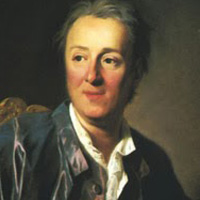The Paradox of Acting by Denis Diderot: An Overview
Diderot, in the essay The Paradox of Acting, dismantles the theoretical distinction between poet, actor, work, and audience. They all, for him work for the unity of the whole. Hazard Adams writes 'What the poet experiences and writes about an actor is authentically felt and that this is what, conveyed to an audience, moves it.' (intro. 365)

Denis Diderot (1713-84)
Diderot introduces his further belief that actor should not be over sentimental by expression unrestrained sentiment and uncontrolled passion. To be over- sentimental is bad because it destroys the unity. Diderot says, “He must have in himself and unmoved and disinterested onlooker. He must have consequently, penetration and no sensibility; the art of mimicking, everything, or which comes to the same thing, the same aptitude for every sort of character and part” (365). It is the audience who feel and the actor just performs in self- controlled and detached way.
Here Diderot wants to ascribe the nature of imitation. He is against Wordsworthian assertion that a poem is “emotions recollected in tranquility.” He is akin to Keatsian sense of “negative capability” since he demands a kind of detachment from emotion- the death of sensibility indeed. Hence imitation is defined as a kind of artistic artifice:
“It is showing things as they are in nature? Certainly not. Where it so the true for stage purposes? It is the conforming of action, diction, face, voice, movement, and gesture, to an ideal type invented by the poet, and frequently enhanced by the player. This type not only influences the tone, it alerts the actor’s very walk and bearing. And hence it is that the player in private and player on the boards are two personages, so different that one can scare recognize the player in private”. (369)
Diderot is of the opinion that there has to be a gap or a distance between a person’s role and real. To this mode, the preference of enactment by head (reason) really gives that sense. It is cultivable and intellectual but not the spontaneous and natural. We should judge or we should be able to judge ourselves, and learn the art of acting. The distance between real and role creates freedom to the characters to enact whatever role they wish. Acting is created through judgment and critique, by becoming the detached onlooker of the role. The characters should stand themselves as witnesses, by creating the intervention of personality. This way then the performance can be effective and purposeful because the sublimity is derived from pain and pleasure both.
Diderot believes that in the case of writing too, we become unable to write while head guides us. Our pen does not move due to the strong emotion. Diderot, by using many French examples, says the role to be not done if it is guided by heart. Emotion is the dark power related to nature and barbarism. We can control the darkness by our consciousness for which Nietzsche gives a name “will to power”. In acting, we should be the ‘unmoved/detached onlookers’.
The acting is like taking the wine for Diderot. The more we take it the more it becomes sweet. Even if we hate our profession, we have to deal with it. For a detached sublime character, whatever role he may perform, either Oedipus or Iago, it does not matter. The action is also ageless that creates pure mimicry.
